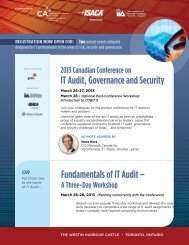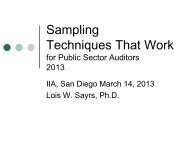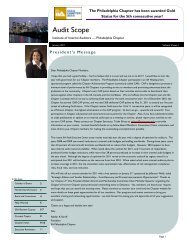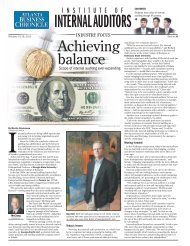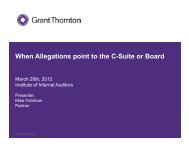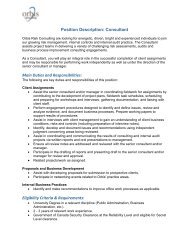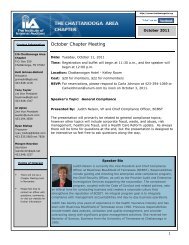March 2012 - The New York Chapter of The Institute of Internal ...
March 2012 - The New York Chapter of The Institute of Internal ...
March 2012 - The New York Chapter of The Institute of Internal ...
Create successful ePaper yourself
Turn your PDF publications into a flip-book with our unique Google optimized e-Paper software.
FULL DAY OUTLINE<br />
I. Introduction<br />
A. <strong>The</strong> Psychology <strong>of</strong> Fraud: A critical tool for auditors, compliance pr<strong>of</strong>essionals, managers and<br />
business executives<br />
B. How psychologists look at and work with fraud and why this is important to you<br />
C. Why you haven't heard about this before (and what you will never hear outside this room)<br />
II. How and why normal people commit fraud<br />
A. Most people are already ethical<br />
B. Eight critical defense mechanisms we all use to make it easier to commit wrongdoing<br />
III. <strong>The</strong> research on deception and lying<br />
A. Current strengths and limitations <strong>of</strong> the research<br />
B. <strong>The</strong> psychology <strong>of</strong> attribution and the self-serving bias, and how it contributes to creating white collar<br />
crime in organizations<br />
IV. <strong>The</strong> hardcore 7-10%: A whole different world <strong>of</strong> people and criminal wrongdoing<br />
A. <strong>The</strong> "Syntonic Syndrome": a general definition<br />
B. Ego-Syntonic people and the lack <strong>of</strong> accountability<br />
C. True stories<br />
V. <strong>The</strong> Syntonic Syndrome: 5 Key Characteristics and Behaviors<br />
A. Accountability<br />
B. Personality Disorders<br />
i. i.e.; anti-social or psychopaths, narcissistic, dependent<br />
C. IQ<br />
D. Differential treatment and manipulation <strong>of</strong> people<br />
E. Control and decision-making process<br />
F. An optional sixth: addiction<br />
VI. Personality Disorders: Eleven type s and three "clusters"<br />
A. Which ones especially connected to fraud and white -collar crime<br />
B. True stories<br />
C. Exercise<br />
VII. IQ<br />
A. Makes all the difference in white collar crime<br />
B. Tied to success rate <strong>of</strong> white collar crimes<br />
VIII. Differential treatment <strong>of</strong> people<br />
A. Signs to look for- there are a lot <strong>of</strong> signs auditors can learn to catch!<br />
B. <strong>The</strong> creation <strong>of</strong> collusion, groupthink, cliques and its connection to fraud<br />
IX. Control and decision-making proce sse s when syntonic people are in power<br />
A. <strong>The</strong> syntonic person's special ability to deceive<br />
X. What a normal person doe s when they break the law vs. one with the Syndrome<br />
XI. Some <strong>of</strong> the Many Organizational traits and situations that encourage the Syntonic<br />
Syndrome<br />
A. Tone at the top and org. culture<br />
i. Cowboy organizational culture vs. other types <strong>of</strong> organizational cultures<br />
B. Laissez-faire management style<br />
6



